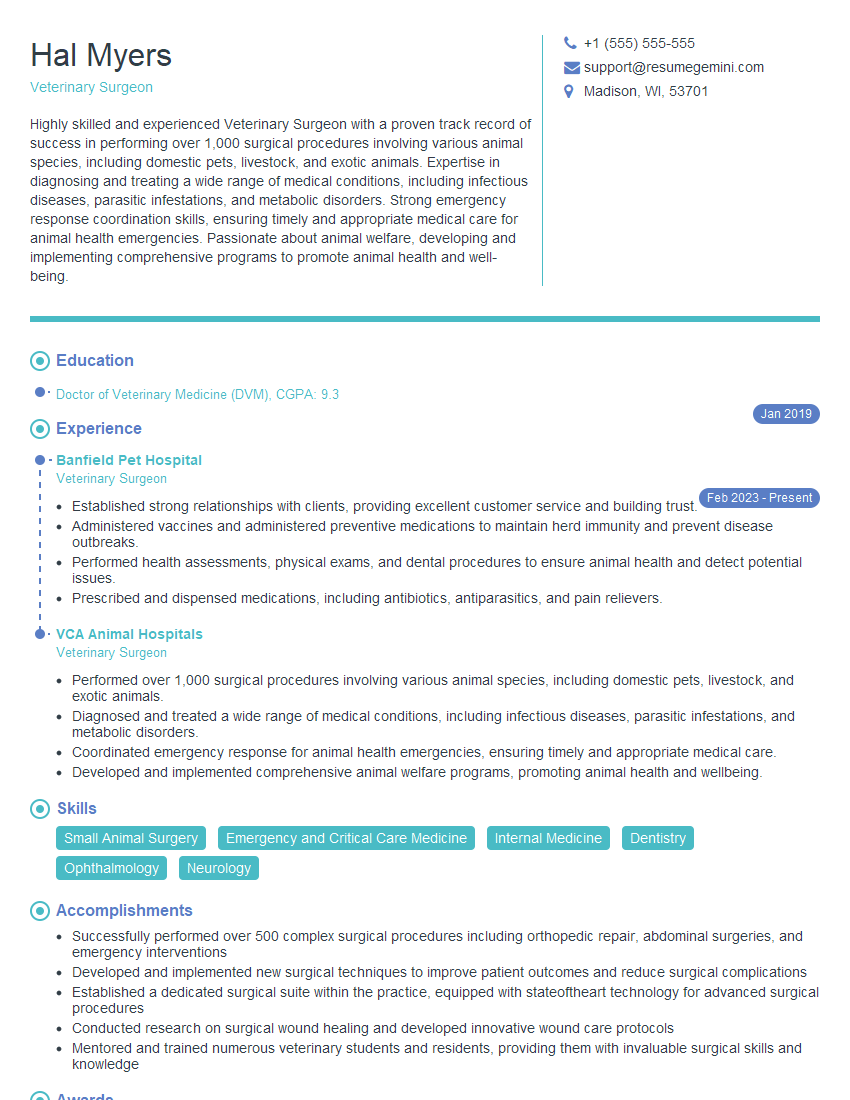Are you a seasoned Veterinary Surgeon seeking a new career path? Discover our professionally built Veterinary Surgeon Resume Template. This time-saving tool provides a solid foundation for your job search. Simply click “Edit Resume” to customize it with your unique experiences and achievements. Customize fonts and colors to match your personal style and increase your chances of landing your dream job. Explore more Resume Templates for additional options.

Hal Myers
Veterinary Surgeon
Summary
Highly skilled and experienced Veterinary Surgeon with a proven track record of success in performing over 1,000 surgical procedures involving various animal species, including domestic pets, livestock, and exotic animals. Expertise in diagnosing and treating a wide range of medical conditions, including infectious diseases, parasitic infestations, and metabolic disorders. Strong emergency response coordination skills, ensuring timely and appropriate medical care for animal health emergencies. Passionate about animal welfare, developing and implementing comprehensive programs to promote animal health and well-being.
Education
Doctor of Veterinary Medicine (DVM)
January 2019
Skills
- Small Animal Surgery
- Emergency and Critical Care Medicine
- Internal Medicine
- Dentistry
- Ophthalmology
- Neurology
Work Experience
Veterinary Surgeon
- Established strong relationships with clients, providing excellent customer service and building trust.
- Administered vaccines and administered preventive medications to maintain herd immunity and prevent disease outbreaks.
- Performed health assessments, physical exams, and dental procedures to ensure animal health and detect potential issues.
- Prescribed and dispensed medications, including antibiotics, antiparasitics, and pain relievers.
Veterinary Surgeon
- Performed over 1,000 surgical procedures involving various animal species, including domestic pets, livestock, and exotic animals.
- Diagnosed and treated a wide range of medical conditions, including infectious diseases, parasitic infestations, and metabolic disorders.
- Coordinated emergency response for animal health emergencies, ensuring timely and appropriate medical care.
- Developed and implemented comprehensive animal welfare programs, promoting animal health and wellbeing.
Accomplishments
- Successfully performed over 500 complex surgical procedures including orthopedic repair, abdominal surgeries, and emergency interventions
- Developed and implemented new surgical techniques to improve patient outcomes and reduce surgical complications
- Established a dedicated surgical suite within the practice, equipped with stateoftheart technology for advanced surgical procedures
- Conducted research on surgical wound healing and developed innovative wound care protocols
- Mentored and trained numerous veterinary students and residents, providing them with invaluable surgical skills and knowledge
Awards
- Recipient of the Veterinary Surgery Excellence Award for outstanding performance in surgical procedures
- Honored with the Compassionate Care Award for exceptional dedication and empathy toward animal patients
- Recognized as a Certified Veterinary Surgeon by the American College of Veterinary Surgeons
- Recipient of the Research Excellence Award for contributions to veterinary surgical literature
Certificates
- Board Certified Veterinary Surgeon
- Diplomate of the American College of Veterinary Surgeons
- Certified Veterinary Surgeon
- American Board of Veterinary Practitioners Certified in Surgery (ABVP-CVS)
Career Expert Tips:
- Select the ideal resume template to showcase your professional experience effectively.
- Master the art of resume writing to highlight your unique qualifications and achievements.
- Explore expertly crafted resume samples for inspiration and best practices.
- Build your best resume for free this new year with ResumeGemini. Enjoy exclusive discounts on ATS optimized resume templates.
How To Write Resume For Veterinary Surgeon
- Showcase your surgical skills and experience in a clear and concise manner.
- Highlight your diagnostic and treatment abilities, including specific medical conditions you have successfully managed.
- Emphasize your emergency response coordination skills and ability to handle high-stress situations.
- Demonstrate your commitment to animal welfare and your passion for promoting animal health and well-being.
Essential Experience Highlights for a Strong Veterinary Surgeon Resume
- Perform surgical procedures on animals of various species, including domestic pets, livestock, and exotic animals.
- Diagnose and treat a wide range of medical conditions, including infectious diseases, parasitic infestations, and metabolic disorders.
- Coordinate emergency response for animal health emergencies, ensuring timely and appropriate medical care.
- Develop and implement comprehensive animal welfare programs, promoting animal health and wellbeing.
- Establish strong relationships with clients, providing excellent customer service and building trust.
- Administer vaccines and administer preventive medications to maintain herd immunity and prevent disease outbreaks.
- Perform health assessments, physical exams, and dental procedures to ensure animal health and detect potential issues.
Frequently Asked Questions (FAQ’s) For Veterinary Surgeon
What are the key responsibilities of a Veterinary Surgeon?
The key responsibilities of a Veterinary Surgeon include diagnosing and treating animal diseases, performing surgeries, and providing preventive care to animals.
What are the educational requirements to become a Veterinary Surgeon?
To become a Veterinary Surgeon, you will typically need to complete a Doctor of Veterinary Medicine (DVM) or equivalent degree from an accredited veterinary school.
What are the career prospects for Veterinary Surgeons?
Veterinary Surgeons can work in a variety of settings, including private clinics, animal hospitals, and research institutions. They can also work in government agencies or in the military.
What are the salary expectations for Veterinary Surgeons?
The salary expectations for Veterinary Surgeons vary depending on their experience, location, and area of specialization.
What are the challenges of working as a Veterinary Surgeon?
The challenges of working as a Veterinary Surgeon can include long hours, emergency situations, and the emotional toll of dealing with sick and injured animals.
What are the rewards of working as a Veterinary Surgeon?
The rewards of working as a Veterinary Surgeon can include making a difference in the lives of animals, helping people care for their pets, and using your skills to solve complex medical problems.